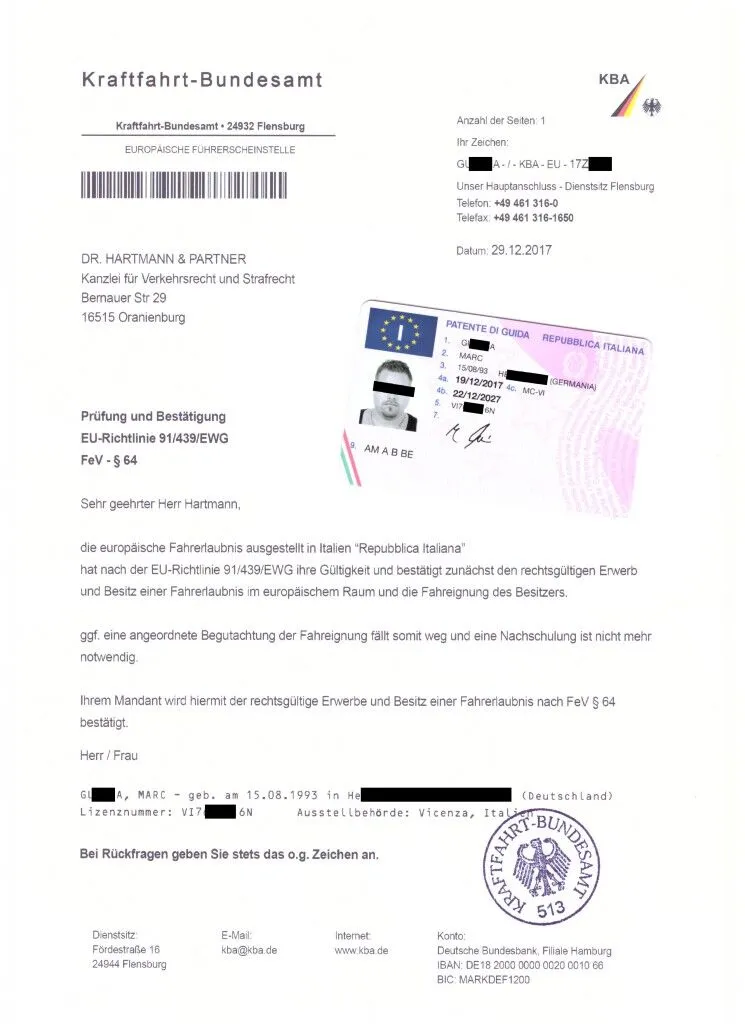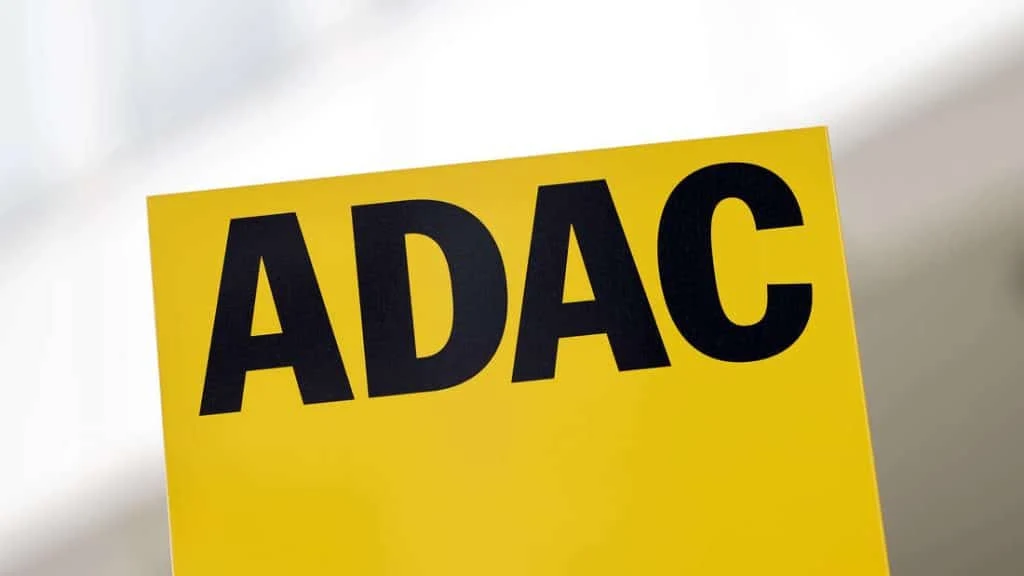DER EUROPÄISCHE AGENT
Wir unterstützen Sie bei allen notwendigen Schritten und Verfahren zum Erwerb Ihres eigenen EU-Führerschein

Warum Europaagenten.com? Ihre Vorteile auf einen Blick!
Werden auch Sie mit uns wieder mobil
⚖️ Rechtliche Unterstützung inklusive
Sollten Sie rechtliche Unterstützung benötigen, übernehmen wir alle außergerichtlichen sowie gerichtlichen Kosten für Sie. Ihre Sicherheit und Rechtssicherheit stehen bei uns an erster Stelle!
🚀 Keine Vorkasse – 100 % Sicherheit für Sie!
Bei uns zahlen Sie erst nach erfolgreicher Leistungserbringung. Keine Anzahlungen, keine versteckten Kosten – volle Transparenz und Sicherheit für unsere Kunden!
⚡ Ihr EU-Führerschein in nur 14 Tagen – garantiert!
Wir wissen, wie wichtig Mobilität ist. Daher garantieren wir Ihnen den Erhalt Ihres EU-Führerscheins innerhalb von 14 Werktagen – schnell und zuverlässig!
🔄 Kostenlose Umschreibung in den deutschen Führerschein
Nach nur 6 Monaten können Sie Ihren EU-Führerschein kostenlos in einen deutschen Führerschein umschreiben lassen – ganz ohne zusätzliche Prüfungen oder versteckte Gebühren!
Offiziell bestätigt vom Kraftfahrt-Bundesamt (KBA) in Flensburg & im EUCARIS-Register abrufbar
Unsere Leistungen im Überblick:

Sie können über uns einen EU-Führerschein aus Polen erwerben – ganz ohne MPU-Test und auf Grundlage der europäischen Gesetzgebung.
Damit sind Sie sowohl in Deutschland (trotz MPU-Auflage), als auch in Österreich und der Schweiz wieder mobil.






Jeder EU-Führerschein wird einzeln durch das Kraftfahrt-Bundesamt (KBA) in Flensburg geprüft und schriftlich bestätigt.
So sind Sie auf der sicheren Seite und erhalten eine rechtsgültige Fahrerlaubnis, die europaweit anerkannt & über EUCARIS abrufbar ist.

Bereits über 5.000 zufriedene Kunden haben sich für diese Möglichkeit entschieden.
Die Beschlüsse des Europäischen Gerichtshofs (EUGH) sowie die deutsche Rechtsprechung haben den Neuerwerb eines EU-Führerscheins im europäischen Ausland als rechtsgültige Alternative zur MPU bestätigt.

Erwerben Sie Ihren EU-Führerschein ohne Vorkasse – keine Anzahlung erforderlich!
Wir sind zuverlässiger als andere Agenturen und begleiten Sie sicher durch den gesamten Prozess.



Vom Kraftfahrt-Bundesamt (KBA) in Flensburg bestätigt
Erwerben Sie den EU-Führerschein über uns und erhalten Sie eine schriftliche Bestätigung vom Kraftfahrt-Bundesamt (KBA) in Flensburg. Somit gehen Sie auf Nummer sicher, dass Ihr EU-Führerschein rechtsgültig und offiziell anerkannt ist.
Durch das Kraftfahrt-Bundesamt (KBA) in Flensburg bestätigt.




Fahrerlaubnis über das EUCARIS-Register abrufbar
Ihre Fahrerlaubnis ist über das EUCARIS-Register abrufbar und kann von den Behörden in ganz Europa überprüft werden.




Anerkennung & Gültigkeit des EU-Führerscheins
Ein in einem EU-Land ausgestellter Führerschein ist in der gesamten Europäischen Union gültig und wird von allen Mitgliedsstaaten automatisch anerkannt.
Wenn Sie in ein anderes EU-Land umziehen, benötigen Sie in der Regel keinen Führerscheinumtausch. Sie dürfen dort mit Ihrem bestehenden Führerschein fahren, sofern:



Die folgenden Führerscheinklassen sind in allen EU-Staaten anerkannt:
AM, A1, A2, A, B, BE, B1, C1, C1E, C, CE, D1, D1E, D und DE
⚖️ Europäischer Gerichtshof bestätigt EU-weite Anerkennung
Der Europäische Gerichtshof (EUGH) hat bereits elf Mal entschieden, dass in der gesamten Europäischen Union ein gegenseitiges Anerkennungspostulat gilt. Das bedeutet: 🇪🇺 Alle EU-Mitgliedsstaaten sind verpflichtet, die ausgestellten EU-Führerscheine gegenseitig anzuerkennen. Eine Ablehnung der Gültigkeit eines EU-Führerscheins würde dem Grundprinzip der Europäischen Union widersprechen.
🔍 Kraftfahrt-Bundesamt (KBA) in Flensburg bestätigt Gültigkeit
Das Kraftfahrt-Bundesamt (KBA) in Flensburg erkennt EU-Führerscheine als rechtsgültig & legal an. 🔹 Prüfung & Bestätigung: Das KBA führt eine Prüfung durch und stellt eine schriftliche Bestätigung über die Echtheit der Fahrerlaubnis aus.
🌍 EUCARIS-Register: Führerschein europaweit abrufbar
Alle EU-Führerscheine sind über das EUCARIS-Register abrufbar und können von Behörden in der gesamten EU überprüft werden. Dadurch wird sichergestellt, dass die Fahrerlaubnis in jedem EU-Land gültig und rechtssicher ist. 📌 Mit einem EU-Führerschein sind Sie europaweit legal & mobil – garantiert durch KBA, EUGH & EUCARIS! 🚗💨
📞 Jetzt mobil werden – Kontaktieren Sie uns!
Lassen Sie sich beraten und holen Sie sich Ihren EU-Führerschein schnell & unkompliziert zurück!

Der EU-Führerschein & die aktuelle Rechtslage
🔹 Gesetzlich bestätigt – Seit dem Jahre 1992 hat der Europäische Gerichtshof insgesamt elf Mal entschieden, das ein gegenseitiges Anerkennungspostulat besteht.
Insbesondere ist der Besitz und der Erwerb eines solchen EU-Führerscheins als Beweis dafür anzusehen, das der Inhaber des EU-Führerscheins am Tag der Ausstellung die maßgeblichen Voraussetzungen erfüllt hat.
Und zwar Mindestvoraussetzungen sowohl hinsichtlich der geistigen und körperlichen Voraussetzungen für den Erwerb der Fahrerlaubnis, als auch hinsichtlich des Wohnsitzerfordernisses.
Das hat das Oberverwaltungsgericht Nordrhein-Westfalen zuletzt am 17. Januar 2014 zum Aktenzeichen 16a, 1292/10 entschieden und taucht immer wieder in den Urteilsbegründungen auf.
Die Ausstellung des EU-Führerscheins ist zunächst ein Beleg dafür das die Voraussetzungen vom Ausstellerstaat überprüft worden sind, und die deutschen Behörden und die deutschen Gerichte sind zunächst an diese Feststellungen gebunden.
Diese Grundsätze wurden mehrfach von deutschen Verwaltungsgerichten bestätigt – zuletzt durch das Oberverwaltungsgericht Nordrhein-Westfalen (Az. 16a, 1292/10) am 17. Januar 2014.
🚗 Das bedeutet für Sie:
🔹 Ein legal ausgestellter EU-Führerschein ist uneingeschränkt gültig.
🔹 Deutsche Behörden & Gerichte sind an die Entscheidung des Ausstellerstaates gebunden.
🔹 Die Rechtsprechung bestätigt: Ein EU-Führerschein darf nicht einfach verweigert oder infrage gestellt werden.
Fazit: Ein EU-Führerschein ist eine sichere & rechtlich anerkannte Möglichkeit, wieder mobil zu werden – ohne MPU & mit voller Gültigkeit!
📞 Lassen Sie sich beraten & starten Sie jetzt!
💬 Sichern Sie sich Ihre legale Fahrerlaubnis – schnell, sicher & ohne MPU!
👉 Jetzt EU-Führerschein beantragen & wieder mobil sein! 🚗💨
📍 Offiziell anerkannt | 100 % rechtsgültig | EU-weit gültig
Ausgezeichnete Bewertung
Basierend auf echten Benutzerbewertungen
Über uns in den Nachrichten
Erfahren Sie, was die Medien über uns berichten!
Aktuelle Artikel und Berichte zu wichtigen Themen rund um den EU-Führerschein und die MPU.

ADAC-Verkehr: EU-Führerschein ohne MPU – Legale Alternative für Autofahrer
Der Artikel erklärt, wie Autofahrer mit einem EU-Führerschein die MPU umgehen können und welche gesetzlichen Regelungen dabei gelten. Er beleuchtet Chancen und Risiken, insbesondere die Frage der Anerkennung in Deutschland und mögliche rechtliche Hürden. Zudem werden aktuelle Gerichtsurteile und Praxisfälle diskutiert, um Klarheit über die Rechtslage zu schaffen.

Rheinische Anzeigenblätter: Der EU-Führerschein ohne MPU – Rechtliche Grundlagen und Gültigkeit
Der Beitrag beleuchtet die rechtlichen Aspekte eines EU-Führerscheins ohne MPU. Er erklärt, wann und unter welchen Bedingungen dieser in Deutschland gültig ist und worauf Betroffene achten sollten. Expertenmeinungen und Gerichtsurteile werden herangezogen, um Klarheit über die aktuelle Rechtslage zu schaffen.

